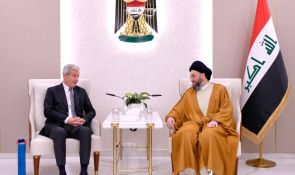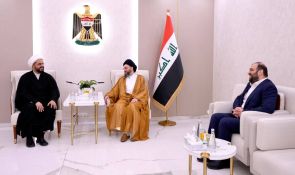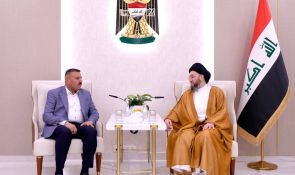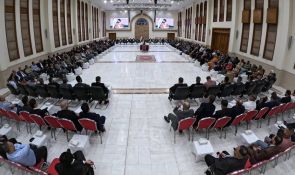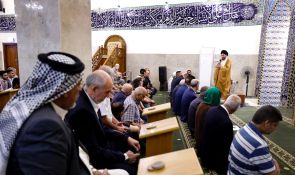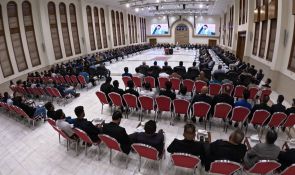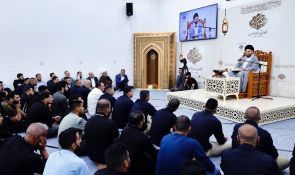SAYYID AMMAR AL-HAKIM: “A just state accepts the arbitration of most people and pays no attention to interest seekers even if they were behind assuming positions.”
In the Name of Allah, the most Gracious, the most Merciful. Peace and blessings with our master and Prophet, master of all Prophets and Messengers, the one loved by the God of the Worlds, the Chosen Father of al-Qasim, Muhammed, and with his good and pure progeny as well as his elite chosen companions.
Significance of People and the General Public being Pleased with the Official
Honored gentlemen, respected shaikhs, dear brothers and virtuous sisters: First of all, I welcome you most beautifully in your council, the council of Ahl al-Bayt, peace of Allah with them all.
We were talking in the previous weeks about the Islamic theory of leadership and administration. We indicated that the covenant of the Commander of the Faithful, Allah’s blessings with him, to Malik al-Ashtar, when he installed him wali (provincial governor) of Egypt, represents the summary of this theory. We reached in discussing this covenant the seventh part in which Ali, peace with him, talks about the significance of awarding preference for the pleasure of the general public over the pleasure of the elite. O official! Keep your eyes fixed on the public, the people, the citizens: Are they pleased or displeased with you? What did such-and-such party say? What did that egotistical person say? What do the aristocratic groups want? All this does not bring you success. You succeed if the people are pleased with you. No matter what remarks there are by the political groups, these remarks can be compromised, and this elite group can be convinced. When you see the people, the nation and the public understanding the official’s performance, they, too, minimize their pressures and the ceilings of their demands. O official! If you enter the convincing arena and the deals inside rooms with closed doors…, no matter how much you give, they will not be pleased with you, nor will the people, either. Thus, you will lose both tracks. It is best for you to refer to the people, to please the people, and to exert your effort in serving the people.
Necessity of the Middle Grounds when it comes to what is Right and what is Just
Such is Islam’s theory. Notice what Ali, peace with him, says: “Let the thing you love the most be what is a middle ground when it comes to what is right.” Three important principles make up the secret behind the success of any official when he faces responsibility: They are the most middle grounds when it comes to what is right in their commitment to what is just, to adhere to the law, without going to extremes or to indifference, to moderation in dealing with the law, supporting what is right as well as the restrictions and measures “the most general in justice”, the most inclusive in fairness. Be fair with everyone without discrimination, without seeking to differentiate among the people, among the citizens. Thirdly, it is “the most pleasing of the subjects.” Undertake steps and measures that are closer to winning the pleasure of most people.
All People cannot be Pleased; Sound Criterion is in winning the acceptance of most People
Ali, peace with him, does not advocate pleasing all people because making all people pleased is an unattainable goal. There are some people who do not want to do the right thing, and there are those who do not accept what is right; they have interests; they seek their interests. No matter what you offer one rightly, justly, equitably, he is not pleased because he has a problem with justice and equity. He wants neither equity nor justice. He always wants to be distinguished from others; therefore, he is never satisfied. Neither the prophets, nor the walis (friends of Allah), nor the righteous, nor the Imams could achieve unanimity. Ali ibn Abu Talib (Ú) could not achieve consensus while ruling. The criterion is pleasing most people, the good people who do not have interests, who are not opportunists, who accept justice. They can be pleased. Such is the basic criterion for achieving justice.
Necessity of the Official Responding to People’s Demands, not to those of the Groups that want Concessions
We talked in the past saying that the logic of Ali, peace with him, and the viewpoint of Islam with regard to administration and leadership is that the State belongs to the people. The people have to be pleased and won over. The public must undertake various measures, including choosing one to place him in charge, the choosing of the ruler. We said that when the political elite went to Ali, peace with him, after the death of the third caliph, they said, “O Ali! We have no choice but you, and we want you to be the caliph of the Muslims.” He (Ú) said to them: “This is a difficult task. Do not imagine that if you now go to Ali ibn Abu Talib, he will run after this matter. Do not imagine that if you make such an offer to him, he will put concessions in place for you and hold secret deals with you. Ali rules according to justice and equity. He has restrictions. He has criteria. He has conditions from which he does not swerve, nor does he distance himself from them. This is something which you may not be able to withstand.” The society he (Ú) was looking at was one of cantons, of movements, of groups, of interests, of opportunism. “I, Ali ibn Abu Talib, cannot please all these folks. Look for someone else. I am the same as I was 25years old at home providing advice. Bring someone else, and I shall also provide him with advice. As long as I am not in charge, and I am not the ruler, I am under no obligation. I provide advice and guidance. If they act upon it, they will make people happy, and if they do not, they will bear the responsibility. I bear no responsibility; I am under no obligation. But on the day I become a ruler, when I take charge, my responsibility will then be to correct, to alter paths; so, look for someone else; this is better for you.”
But they insisted on him. They said that they had no other choice, even after he was frank with them about his program, a program in which there are no bargains, no discrimination, no politicizing, one in which there is clarity. They said they accepted, and they would go along with him.
Handling Responsibility is clear to People, is not done behind Closed Doors
When Ali, peace with him, said, “Good; if you go along with me, the allegiance is not done behind closed doors, in narrow offices and dark alleys. Allegiance must take place at the Mosque, with the public. You have agreed. What about the people? Do they agree? Let us see the people. Ali does not accept the oath of allegiance in secrecy, covertly. Ali accepts the oath of allegiance among the people, and the people must accept it.”
The went to the Mosque, and people rallied round him, swearing the oath of allegiance to him. But what Ali, peace with him, had expected did, indeed, take place when his just measures became in effect. When the concessions shrunk, those in which there were no discrimination, their voice came out…
Look at what Ali, peace with him, says about this subject in the third sermon in Nahjul-Balagha: “Nothing gave me the sense of an awe,” Ali, peace with him, uses a word that connotes deep concern, “awe”, “except that people faced me like the hyena’s mane,” a reference to the intensity of the crowd, an awe due to excessive stampeding over Ali, peace with him, on the day of swearing the oath of allegiance. “The people throng on me from all directions,” calling, rallying behind Ali, peace with him, all desiring to swear the oath of allegiance to the Commander of the Faithful, so much so that “even both Hassans (al-Hassan Senior and al-Hussain Junior) were stampeded.” Both al-Hassan and al-Hussain were stampeded among those feet in the midst of steps, emotions and feelings. “[My clothes covering] both my sides were torn” as a result of the stampede. “They assembled around me as cattle crowd” when they assemble at the watering place. “They rallied people round me,” a reference to a sweeping public referendum. You see how sometimes one person wins the elections at the threshold by one half plus one, whereas there is someone else who reaps a majority vote. The oath of allegiance which was sworn to Ali ibn Abu Talib (Ú) was one of a sweeping majority: All people went out; all people stated their word in support of him.
Right did not please everyone, some were annoyed, calling for mutiny
“When I took charge,” that is, when he (Ali, peace with him) started implementing Islam’s genuine program of justice and equity, discriminating against none, “a group reneged.” (Those who reneged were those who violated their own oath, a reference to the Battle of the Camel, the fellows of the camel, and to Talhah and az-Zubair. A group reneged, while “another group split” from the folds of Islam, a reference to the Kharijites (Khawarij), a reference to the Nahrawan Battle, “while yet others transgressed and abused” in the Battle of Siffin, a reference to the supporters of Mu`awiyah. These three groups, those who reneged from their oath of allegiance, those who became Kharijties and those who fought the Imam (Ú) in the Battle of Siffin were “as if they did not heed what Allah, the most Praised One, the most Exalted, telling them that the Hereafter will be for those who do not aspire to be high in the land, who do not cause corruption, and the good end is the lot of only the righteous.” All these people rebelled, as if they did not hear what the Lord of the Worlds said, the One Who told them that there is life after death, the Hereafter, which He made for those who do not want to rise above others, who do not commit corruption, who tread the right path, who accept justice and equity. The Hereafter belongs to these folks. It is as though these groups did not read [the Qur’an]. Then Ali, peace with him, retracts and says, “Yes, by Allah, they heard it and understood it.” They even explained it better than others. When they explained it, they had the power to convince others of it; they did not have any problem with seeing; vision is very clear for them. So, why, O Ali, did they not go along with you? “But life seemed to be sweet in their eyes.” They saw life beautiful. “And they liked its glitter,” its decoration. Life’s decoration appealed to them: late model cars, mansions, servants, trains, resources, pomp, nice and opulent offices, mansions, services, potentials, concessions, deputations… all pleased them. They felt comfortable with them. They surrendered to life’s adornment. The problem is that they were not ignorant of it, but life did not let them walk along the right path. “By the One Who split the seed” do I swear, i.e. by Allah Who splits the seed, Who causes plants to grow, Who creates the breeze, Who creates the souls…, “had it not been for what did take place,” had it not been for the people swearing the oath of allegiance to me, for the poor people, for the citizens, for their hope which they wrested on Ali ibn Abu Talib, for their argument that their supporter was there… [I would have behaved differently with them]”.
Right is Sovereign in the Presence of Sincere Ones, Scholars from whom Allah took a pledge that they would never tolerate oppression
Had it not been for the presence of sincere people who did not entertain any selfish interest, who did not covet this life, who hoped for the Hereafter, for righteousness and equity, those who did not ask Ali (Ú) for anything, men who stood to support Ali’s plan while not having narrow calculations and financial calculations of their own…, had it not been for the presence of such men, and had it not been that “Allah undertook from the scholars that they would never endorse an oppressor when he oppresses,” when they see an oppressor with a bloated stomach, a reference to indolence, to favoritism…, Allah undertook a covenant from the scholars not to accept to endorse the oppressors when they take to favoritism while the oppressed are starved, for this means rights are wasted… Allah undertook from the scholars a covenant that they do not accept to see what belongs to the oppressed being taken away, that they must support the oppressed as they faced their oppressor… Had it not been for the legitimate evidence, for the presence of brave, heroic and sincere men…, had it not been for the will fo the people, for the public’s sweeping referendum, and had it not been for the covenant which Allah undertook from the scholars that they would not remain idly by…, “I would have abandoned the whole affair,” similarly to a knight alighting from his horse, throwing its reins aside, while I never sought this life and its adornment. This is a Shari’a-imposed responsibility. “It is the one that brought me to the position of taking charge, of accepting responsibility. I would otherwise have let the last people drink of the cup of the first people, and you would have seen how this world of yours in my esteem being no better than a goat’s sneeze.”
Life has no value in the eyes of Ali, peace with him. The basis is people accepting justice and equity. This is the theory which Ali ibn Abu Talib (Ú) submits in government and in administration. In Sermon 33 of Nahjul-Balagha, what does Ali, peace with him, says? Abdullah ibn Abbas, the Arab’s man of wisdom, says that he entered the place of meeting of the Commander of the Faithful Ali, peace with him, in Thi-Qar and said to him, “Congratulations to the people of Thi-Qar on account of Ali ibn Abu Talib passing by near them,” as Ali (Ú) was mending his sandal. Ali ibn Abu Tali, peace with him, did not value responsibility except as much as it can prevent oppression and establish righteousness. Ali ibn Abu Talib was mending his sandal which was torn due to his walking, wars and travels. It was torn, and when Ali (Ú) had the opportunity to get the needle and the thread out to mend it, Ibn Abbas came to him and saw him mending his sandal. Ali (Ú) asked him, “What is the value of this sandal, O Ibn Abbas?!” The latter answered saying that it was worthless; it was not good; it had no sale price, being used. Ali, peace with him, said, “By Allah! It is dearer to me than taking charge of you all!”
This worthless sandal is dearer to Ali (Ú) than being in charge of the Muslims from this standpoint “except if I establish righteousness or prevent falsehood,” and this is what made Ali (Ú) a legend.
Ali did not easily become a legend. He made that statement and he believed in it, and it was not a statement of politics. Ali ibn Abu Talib (Ú) is frank and clear, and such is life according to Ali’s logic. This government, this authority, according to Ali’s logic, is as worthless as a torn sandal unless he establishes justice or supports righteousness or prevents an oppressor and quells falsehood. Then he came out and addressed people. He said, “What is with me and with Quraish?” That is, “I have no personal problem with Quraish; I am the son of Quraish. I do not envy Quraish. I have no crisis with Quraish so I would bear grudge against Quraish and its families, history and originality.” “What is with me and with Quraish? By Allah, I fought them when they were disbelievers.” That is: When I raised the sword in their faces, they were disbelievers, and I wanted to correct the deviation. They were disbelievers who had no faith in righteousness and in equity, and “I shall fight them when they are tested with sedition. Today, I stand in the face of Quraish due to the aspirations, ambitions and desires which Allah does not approve. They now have ambitions. They want to seize the government. The issue is one of principles. I, Ali ibn Abu Talib, now stand and object. This objection is not due to grudge or to personal issues; rather, it stems from principles. And only yesterday was I their man. I was yesterday the son of Quraish just as I today am their fellow.”
Grudge against Ahl al-Bayt resulted from their being chosen by Allah Who preferred them over all people
“If I oppose them, it is not due to a personal reason but because they have distanced themselves from the path, from justice which was mandated by Allah, the most Praised and the most Exalted, Who watches over anyone taking charge [of the Muslims’ affairs]; this is my problem with them.” “By Allah, Quraish does not harbor grudge against us except because Allah favored us over them.” The problem with Quraish, their envy of Ali ibn Abu Talib and the Ahl al-Bayt (Ú), is due to the latter having been chosen by Allah Who granted them prestige, logic, knowledge, fairness and the people’s love for them. They hate us as they see people want us, and this is their problem with us. “So we let them enter our space”: When people came, we opened the door for them and told them to enter our homes, to take, and that we did not want them only for our own selves. They hated us. Why should people go to Ali rather than to others? This is Quraish’s problem with Ali, peace with him.
So, these are the three principles which the Commander of the Faithful, Allah’s peace and blessings with him, which achieve the pleasure of the public. They achieve public acceptance. They rally people round the official if he adheres to them, if he commit himself to following them. This talk will be continued.


